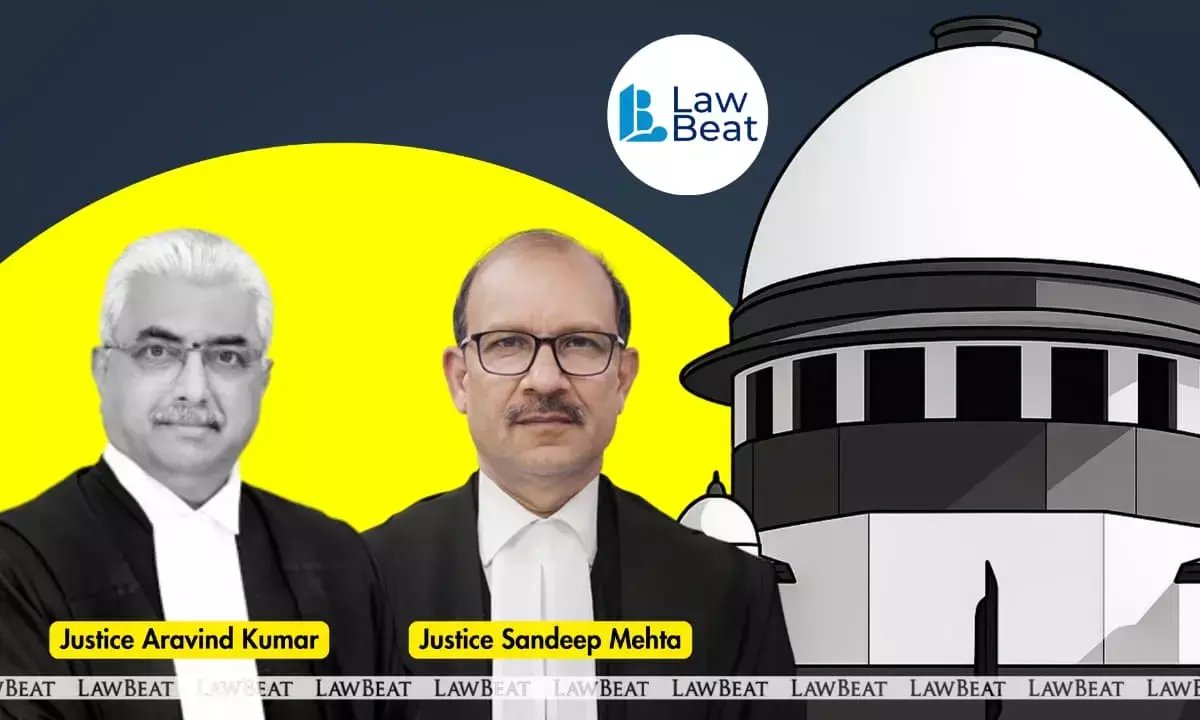'Apparent Overwriting on Marksheet Can’t Prove Tampering’: SC Sets Aside Conviction of Undergraduate Student

The Supreme Court sets aside conviction in marksheet forgery case
The Supreme Court recently allowed an appeal filed by a woman against her conviction in a case of cheating and forgery, in a matter arising out of an allegation of "apparent overwriting" on her marksheet in compulsory English subject to secure her admission to third year of Bachelor of Social Work in a college affiliated to Nagpur University.
A bench of Justices Aravind Kumar and Sandeep Mehta set aside the conviction and sentence awarded to the appellant, Vandana, after finding that the prosecution had not discharged its burden regarding the authorship of the alleged forgery.
The bench pointed out that the courts below had rested essentially on the visual inference of overwriting to hold that tampering stood established. Court noted that no handwriting or forensic expert opinion was obtained regarding the authorship of the alleged tampering.
Having examined the matter, the bench observed, "We find the conviction to be unsustainable. We say so because after meticulously examining provisions and the judgements of the court below it is clearly discernible that all the courts while appreciating the evidence on record have confined themselves to the issue of establishing the alleged tampering".
The appellant's counsel contended that the courts below overlooked the evidentiary infirmities in the prosecution’s case, particularly in light of the absence of any handwriting expert or forensic verification of the allegedly forged marksheet or notification, and still proceeded to convict her. He also submitted that overwriting seen by bare eyes without expert corroboration is an unsafe basis for criminal conviction in light of the standard of proof required under the criminal law. The counsel further said that no university official who prepared or dispatched the marksheet or notification was examined as a witness, depriving the accused of a fair opportunity to challenge the chain of custody or authorship of the documents.
Court noted that in the instant case, the mark-sheet and the revaluation notification went through a chain of custody: firstly, from the appellant to the admission clerk, and after the admission clerk had verified and received the alleged documents, the custody was routed to the principal of the college. The bench said the prosecution had failed to prove, by any reliable evidence, that the alleged tampering was effected by the appellant herself or that this tampering had occurred while the documents were in the exclusive custody and control of the appellant.
On the contrary, court noted that the material evidence would disclose that the documents passed through institutional hands for scrutiny, endorsement, and forwarding, and at certain points of time, they were not in the custody of the appellant at all.
"In such circumstances, the passing of the alleged document through the hands of several persons before it was detected as forged renders unsafe to arrive at a conclusion that appellant had authored the tampering or possessed the contemporaneous knowledge of such tampering. It is apt to mention that it is well-established principle of law that suspicion, howsoever grave, cannot replace the standard of legal proof," the bench held.
Court also emphasised that while expert opinion is not mandatory, nevertheless when authorship is central to establish the guilt of the accused and by direct evidence it is not demonstrated to show that the alleged writing has been made in the presence of a witness, non-examination of an expert or any other cogent proof of authorship to corroborate the alleged forgery beyond reasonable doubt weighs heavily against the prosecution.
The bench further observed, "Therefore, the courts below treated 'apparent overwriting' as conclusive which approach is alien to the standard proof beyond reasonable doubt".
Court also pointed out that records do not establish the mens rea which is a prerequisite for Section 471 IPC (knowledge/reason to believe) or for attempt to cheat under Section 420 read with Section 511 IPC being present.
It noted the documents were stamped by college authorities and passed through administrative scrutiny.
In the absence of evidence that the appellant had dishonest intention to either make the false document or knew of its falsity while submitting it, the mental status or mens rea remains unproved.
The bench also found non-compliance with Section 313 CrPC, as several incriminating circumstances were put to the appellant in compound and omnibus questions.
"This court has constantly held and we reiterate that Section 313 is not an empty formality. Where there is failure to put material circumstances fairly and distinctly, it causes prejudice and vitiates reliance placed on such circumstances. The said defect strikes at a valuable statutory right of defence of the accused," the bench said.
In the present case, the court pointed out, it is on record that the accused was not possibly able to understand the incriminating circumstances put against her and was not able to answer properly because of the compound questions.
"Nevertheless, the courts have relied upon the statement which in our considered view causes prejudice to the accused," the bench concluded.
Case Title: Vandana Vs State of Maharashtra
Bench: Justices Aravind Kumar and Sandeep Mehta
